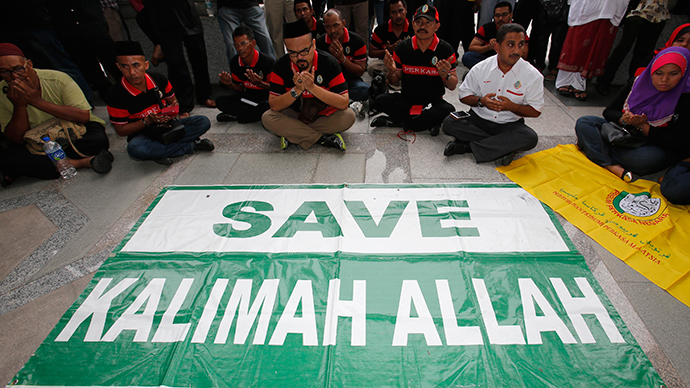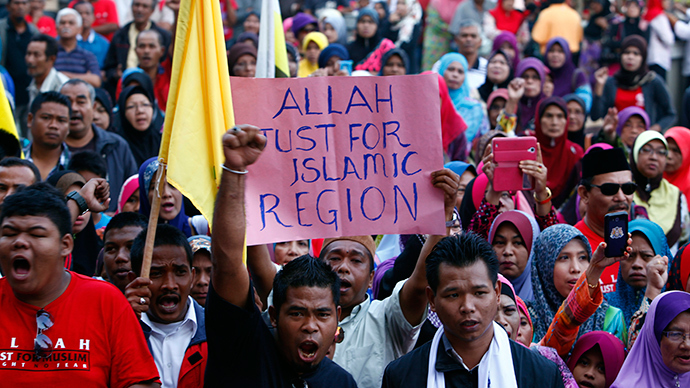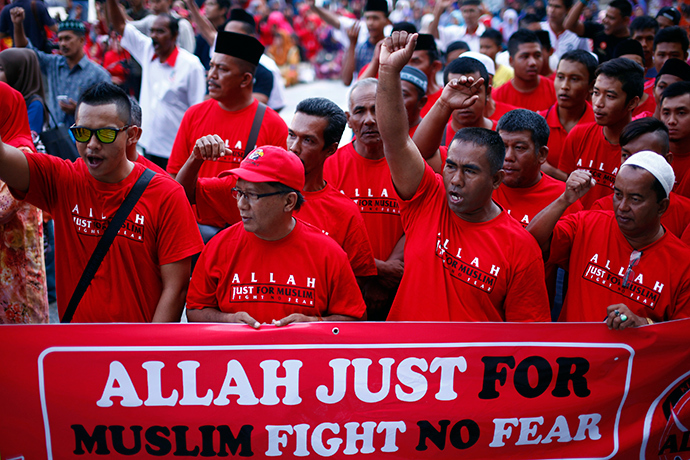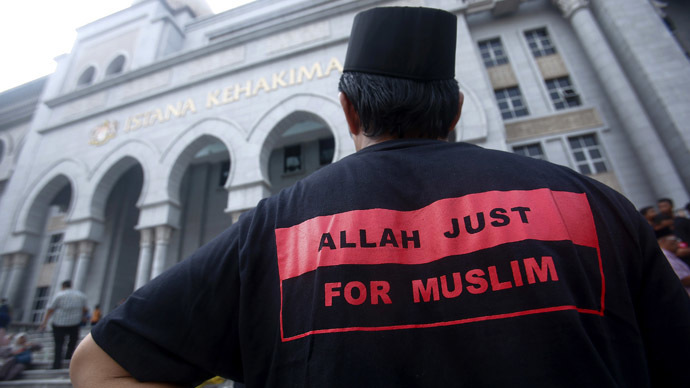Malaysia’s ‘Allah’ verdict & the rising far right

The recent ruling by Malaysia’s highest court to restrict non-Muslims from using the word ‘Allah’ has triggered a wider national debate deepening polarization among the country’s various ethnic and religious communities.
Malays, the country’s dominant ethnic group, are constitutionally ascribed as Muslims from birth, and their language borrows many terms from Arabic, including ‘Allah’. Malaysia, along with neighboring Brunei, are among the only countries in the world to regulate the use of the word ‘Allah’ and other terms deemed to be exclusive to Islam among its non-Muslim citizens.
A court ruling in 2007 prohibited a Catholic newspaper, the Herald, from using ‘Allah’ to describe the Christian god in the local Malay-language edition of its newspaper. In its attempts to appeal the judgment, the Church has argued that Christians in the Muslim-majority nation have used ‘Allah’ in Malay-language bibles and daily prayers for centuries.
Although the prohibition of the term only applied to the Herald newspaper, religious authorities in the state of Selangor took the unprecedented step of raiding the offices of the Bible Society of Malaysia in January, confiscating 321 Malay-language bibles on the basis that public disorder would ensue unless ‘Allah’ remains exclusive to Islam. The Selangor Islamic Religious Council refuses to return the bibles, in defiance of the country’s attorney general.
When a lower court ruled in favor of the Church to reverse the government ban in 2009, widespread anger ensued that saw arson attacks and vandalism at churches, temples, and other places of worship. The Court of Appeals reversed the lower court’s decision in 2013, which prompted the Catholic Church to bring their case to the Federal Court, which rejected their challenge in a 4-3 judgment last week.
This controversy spawned by this issue has proven capable of enflaming communal tensions, and stoking activism and fiery protests from far-right Malay groups who view the term ‘Allah’ as an exclusive religious symbol, that despite the term’s pre-Abrahamic origins, is rooted in the Koran. The brand of Islam practiced by Malays – who make up some 64 percent of the population – is deeply interwoven with the community’s sense of ethnic identity, and an understanding of their perspective is crucial to grasping the issue.

‘Allah’ in context
As Muslims, Malays use the term ‘Allah’ to refer to their god, which is perceived within a strict monotheistic orientation. Malays are determined to defend their monopoly over the term ‘Allah’ as understood in a monotheistic Islamic sense because they believe the word cannot correspond with the Christian notion of god due to the Christian belief in the Trinity.
The term ‘Allah’ predates both Islam and Christianity, and Arab Christians throughout the Middle East – and Christian communities elsewhere, such as in Indonesia – have historically used the term to refer to the Christian god without generating friction between Christian and Muslim communities.
The territory of Malaysia is geographically divided between the more populous western peninsular, which hosts the administrative capital and the Sultanate, and the eastern states of Sabah and Sarawak located across the South China Sea on the island of Borneo, where the majority of Christians reside.
The indigenous Christian minority in Sabah and Sarawak have indeed used ‘Allah’ in Malay-language bibles for centuries, but the Malay community only began their fierce opposition in recent times when non-indigenous Chinese and Indian Christian communities in the western peninsular states began adopting the word in sermons and bibles.
Christian and Muslim communities in Peninsular Malaysia lack the cultural, ethnic, and social bonds that they maintain throughout the Arab world and elsewhere, which is why local religious misunderstandings have become significantly more enflamed by comparison.
Most Christians on the peninsular worship in English, Tamil or various Chinese dialects, and refer to God in those languages, and so the insistence of those communities to also use the term ‘Allah’ has been met with hostility by the Malay community, who are deeply suspicious that missionary-oriented Christians would use the term to proselytize Muslims into conversion, a crime in Malaysia.
The basis for their skepticism is rooted in the region’s history of colonization by European powers. Dutch colonialists, who controlled what is now modern-day Indonesia until the Second World War, intended to spread their gospel to Southeast Asia, making Malay the first language into which the bible was translated outside of Europe and the Middle East.
In an attempt to proselytize Muslims into embracing Christianity, Dutch translators deceptively incorporated terms borrowed from Arabic such as ‘Allah’ and incorporated them into the Malay bible, rather than use the Malay word for god (tuhan). From the Malay perspective, the insistence of non-Muslim communities to use ‘Allah’ is inexorably viewed as an affront by outsiders to a concept that is central to Islam.

When tail wags dog
Despite the sensitivity of the matter and the historical grievances involved, this issue could have been resolved in a far more amicable way, involving dialogue initiatives with the country’s various community leaders and religious figureheads to diffuse antagonisms. The government’s support for regulating the term is widely perceived as an effort to assuage far-right Malay groups, who regularly use incendiary language and promote an adversarial interpretation of Islam.
Prime Minister Najib Razak, who delivered the ruling coalition its slimmest victory ever in last year’s general elections, has put much emphasis on showcasing Malaysia’s brand of political Islam as being moderate and capable of sustaining national harmony since taking office in 2009.
Despite his administration’s inclusive message, the country’s leadership is widely accused of allowing right-wing fringe elements to dictate the Malay community’s agenda in an attempt to consolidate voter support, as evidenced by the government’s ambivalent stance toward groups that have regularly made provocative statements.
The controversy around the seizure of Malay language bibles earlier this year has set a troubling precedent. Following last week’s ruling, the prime minister's office released a statement that said the court decision would only impact the Herald newspaper. Attorney-General Abdul Gani Patai instructed that authorities in Selangor had erred in the seizure of Malay-language bibles and maintained that the action taken by the state religious council was unwarranted.
Selangor’s religious council, however, has refused to comply, insisting it will continue to seize bibles that contain the word ‘Allah’ in the state. The council has warned that those found distributing the Malay-language bibles would be arrested. That a state religious council can flout directives from the country's chief executive officer is inherently problematic. Members of Perkasa, a rightwing Malay rights group that has traditionally supported the ruling coalition, have made disturbing statements in support of the bible seizures.
Ruslan Kassim, a branch leader of Perkasa in the state of Negri Sembilan,threatened to behead those who opposed the bible seizure on the basis that such a position would betray Islam. Zulkifli Noordin, former Perkasa deputy president, recently accused those who opposed the ‘Allah’ ruling as being “lower than animals,” and asked if those figures were prepared for another May 13, a reference the country’s traumatic 1969 race riots.
The perspectives of Perkasa and groups like it are grounded in undeniable historical injustices, that of a complex history of being subjugated and by British colonialism, and later economically subdued to large extent by Chinese and Indian communities following the country’s independence in 1957. However, the language used by the organization in the examples given works to sow communal anxiety and is thoroughly unconstructive.

Najib has taken much flak for his reluctance to chastise figures that espouse inflammatory language and for his general absence of input on polarizing national matters. His critics have chastised him for recent claims that human rights and secularism were being used to spread deviant thinking among Muslims, which the prime minister called“the most dangerous threat to the Islamic faith.”
When speaking to members of his party last week, Najib called on his compatriots to emulate the bravery shown by the Islamic State of Iraq and Syria (ISIS) during its brutal advance across areas of northwestern Iraq, sparking a flurry of criticism on social media.
These statements represent a significant departure from previous remarks at venues such as the UN General Assembly, where Najib used his address last year to deplore Islamic extremism and sectarianism, which he then posited as the greatest threat to Muslims. A spokesperson for the Malaysian government later issued a statement saying that PM’s remarks in no way indicate support for ISIS.
Najib’s statement, which can be perceived as a reluctant glorification of ISIS, is particularly puzzling since Malaysia is actively attempting to prevent a growing amount of its citizens from taking up arms in the Syrian civil war on the side of rebel militias. These comments should be seen in the context of the government attempting to accommodate fringe groups that have become increasingly successful at influencing the state-sanctioned interpretation of Islam.
In the prevailing social milieu of the country, there must be greater political will on the part of the government to take reconciliatory measures to diffuse communal and religious anxieties. If the authorities are concerned that Muslims would become confused if other non-Muslims use the word ‘Allah,’ then the government should make efforts to educate the public about the history of the word and its usage elsewhere to promote a correct understanding of the issue.
In light of recent developments, many who once placed great hope in Najib to deliver impactful social reforms in line with his stance of moderation and tolerance now feel like his government has lost the plot.
The statements, views and opinions expressed in this column are solely those of the author and do not necessarily represent those of RT.
The statements, views and opinions expressed in this column are solely those of the author and do not necessarily represent those of RT.













